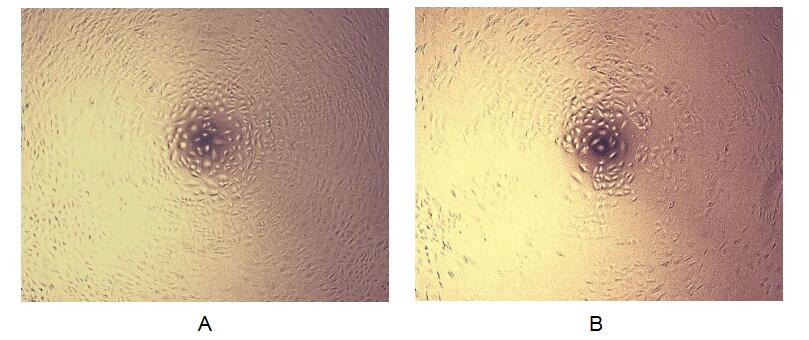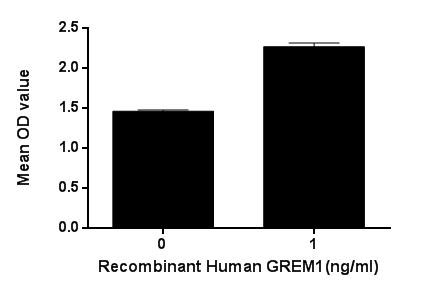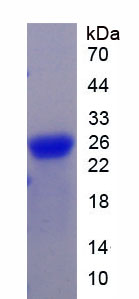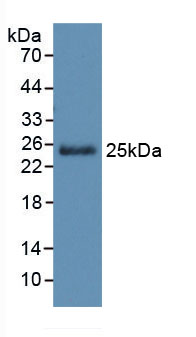Active Gremlin 1 (GREM1) 

PIG2; CKTSF1B1; DAND2; IHG-2; DAND2; DRM; Increased in high glucose protein 2; Cell proliferation-inducing gene 2 protein; Cysteine knot superfamily 1, BMP antagonist 1
- UOM
- FOB US$ 240.00 US$ 600.00 US$ 1,200.00 US$ 3,600.00 US$ 9,000.00
- Quantity
Overview
Properties
- Product No.APC128Hu02
- Organism SpeciesHomo sapiens (Human) Same name, Different species.
- ApplicationsCell culture; Activity Assays.
Research use only - DownloadInstruction Manual
- CategorySignal transductionTumor immunityDevelopmental scienceBone metabolism
- Buffer Formulation20mM Tris, 150mM NaCl, pH8.0, containing 1mM EDTA, 1mM DTT, 0.01% SKL, 5% Trehalose and Proclin300.
- Traits Freeze-dried powder, Purity > 97%
- Isoelectric Point9.6
Sign into your account
Share a new citation as an author
Upload your experimental result
Review

Contact us
Please fill in the blank.
Activity test

Figure. Cell proliferation of A549 cells after stimulated with GREM1.
Gremlin (GREM1) is an inhibitor in the TGF beta signaling pathway. GREM1 and other BMP antagonists are important in the survival of cancer stroma survival and proliferation in some cancers. The protein expression is found in many cancers and is thought to play important roles in uterine cervix, lung, ovary, kidney, breast, colon, pancreas, and sarcoma carcinomas. A proliferation assay was conducted to detect the bioactivity of recombinant human GREM1 using A549 cells. Briefly, A549 cells were seeded into triplicate wells of 96-well plates at a density of 5,000 cells/well and allowed to attach, replaced with serum-free overnight, then the medium was replaced with 2% serum standard DMEM prior to the addition of various concentrations of GREM1. After incubated for 96h, cells were observed by inverted microscope and cell proliferation was measured by Cell Counting Kit-8 (CCK-8). Briefly, 10µL of CCK-8 solution was added to each well of the plate, then the absorbance at 450nm was measured using a microplate reader after incubating the plate for 1-4 hours at 37°C. Proliferation of A549 cells after incubation with GREM1 for 96h observed by inverted microscope was shown in Figure 1. Cell viability was assessed by CCK-8 (Cell Counting Kit-8) assay after incubation with recombinant GREM1 for 96h. The result was shown in Figure 2. It was obvious that GREM1 significantly increased cell viability of A549 cells.
(A) A549 cells cultured in DMEM, stimulated with 1ng/mL GREM1 for 96h;
(B) Unstimulated A549 cells cultured in DMEM for 96h.

Figure. Cell proliferation of A549 cells after stimulated with GREM1.
Usage
Reconstitute in 20mM Tris, 150mM NaCl (pH8.0) to a concentration of 0.1-1.0 mg/mL. Do not vortex.
Storage
Avoid repeated freeze/thaw cycles. Store at 2-8°C for one month. Aliquot and store at -80°C for 12 months.
Stability
The thermal stability is described by the loss rate. The loss rate was determined by accelerated thermal degradation test, that is, incubate the protein at 37°C for 48h, and no obvious degradation and precipitation were observed. The loss rate is less than 5% within the expiration date under appropriate storage condition.
Increment services
-
 BCA Protein Quantification Kit
BCA Protein Quantification Kit
-
 Molecular Mass Marker for Protein
Molecular Mass Marker for Protein
-
 Monoclonal Antibody Customized Service
Monoclonal Antibody Customized Service
-
 Polyclonal Antibody Customized Service
Polyclonal Antibody Customized Service
-
 Protein Activity Test Experiment Service
Protein Activity Test Experiment Service
-
 Electrophoretic Mobility Shift Assay (EMSA) Experiment Service
Electrophoretic Mobility Shift Assay (EMSA) Experiment Service
-
 Buffer
Buffer
-
 Lentivirus Packaging Experiment Service
Lentivirus Packaging Experiment Service
-
 Adenovirus Packaging Experiment Service
Adenovirus Packaging Experiment Service
-
 Real Time PCR Experimental Service
Real Time PCR Experimental Service
-
 Spike RBD Protein (S-RBD)
Spike RBD Protein (S-RBD)
-
 Protein G
Protein G
-
 Protein A
Protein A
Citations
- Intrinsic BMP Antagonist Gremlin-1 as a Novel Circulating Marker in Pulmonary Arterial HypertensionPubMed: 25926293
- Overexpression of Gremlin promotes non-small cell lung cancer progressionPubMed: 26392110
- Triple head-to-head comparison of fibrotic biomarkers galectin-3, osteopontin and gremlin-1 for long-term prognosis in suspected and proven acute heart failure patientsPubMed: 26539964
- Triple head-to-head comparison of fibrotic biomarkers galectin-3, osteopontin and gremlin-1 for long-termprognosis in suspected and proven acute heart failure patientsPubmed:26539964
- BMPR2 Mutation-independent Mechanisms of Disrupted BMP Signaling in IPAHPubmed:27187737
- GREM1 Is a Key ReCavia (Guinea pig )lator of Synoviocyte Hyperplasia and InvasivenessPubmed:26834210
- The BMP2 variant L51P restores the osteogenic differentiation of human mesenchymal stromal cells in the presence of intervertebral disc cells.pubmed:28266688
- Genomic reprograming analysis of the Mesothelial to Mesenchymal Transition identifies biomarkers in peritoneal dialysis patients.pubmed:28327551
- Bone Morphogenic Protein Type 2 Receptor Mutation-Independent Mechanisms of Disrupted Bone Morphogenetic Protein Signaling in Idiopathic Pulmonary Arterial …rcmb.2015-0402OC
- Gremlin-1 suppression increases BMP-2-induced osteogenesis of human mesenchymal stem cellspubmed:28260028
- Platelets as a novel source of Gremlin-1: Implications for thrombo inflammationpubmed:27929199
- Gremlin, A Potential Urinary Biomarker of Anca-Associated Crescentic GlomerulonephritisPubmed: 31053735
- Transcriptomic and Proteomic Analyses Reveal the Potential Mode of Action of Chondrocyte Sheets in Hyaline Cartilage RegenerationPubmed: 31878307
- Suppression of microRNA-23a/b-3p delays the development degenerative joint disease by activating Grem1 and TGF-β/Smad signaling pathwayPubmed: 32186934
- Protective role of microRNA-23a/b-3p inhibition against osteoarthritis through Gremlin1-depenent activation of TGF-β/smad signaling in chondrocytesaPubmed:35441352
- CAF‐derived exosomes transmitted Gremlin‐1 promotes cancer progression and decreases the sensitivity of hepatoma cells to sorafenibPubmed:35638711









